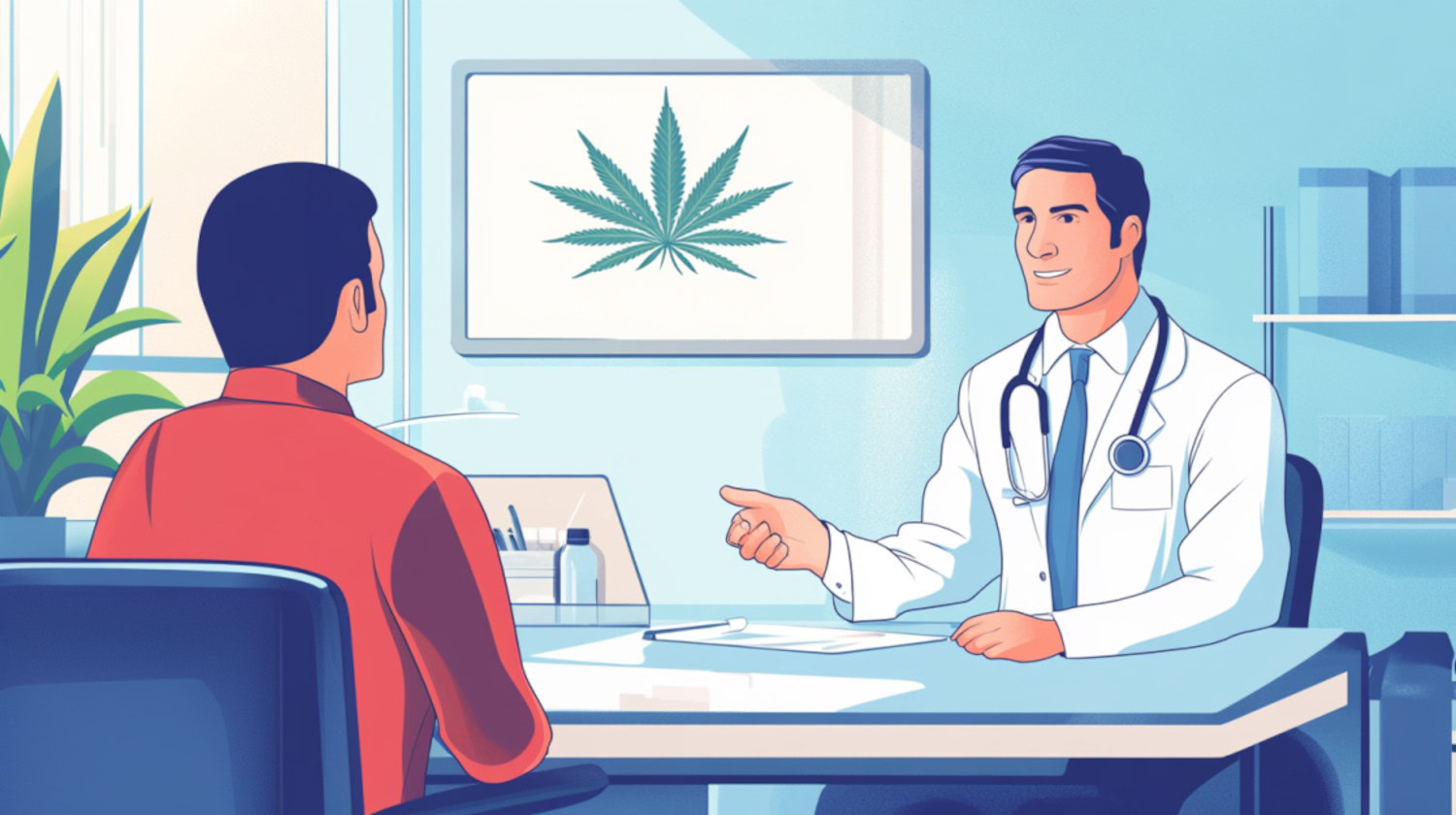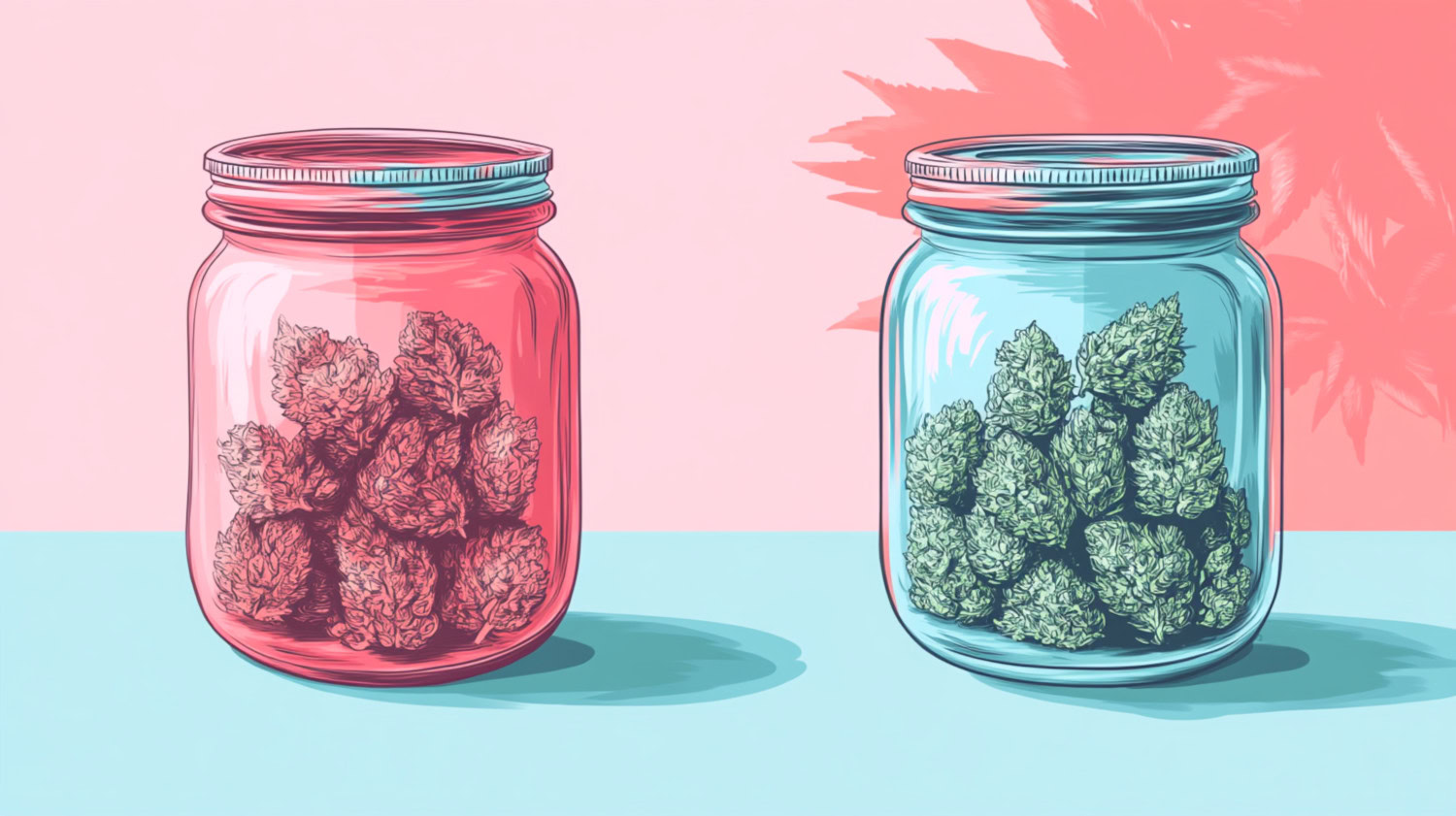In This Article
- Why See a Medical Cannabis Doctor?
- Important Questions to Ask Your Medical Cannabis Doctor
- What Conditions Can Medical Cannabis Treat Effectively?
- How Do I Find the Right Dose?
- What Form of Medical Cannabis is Best for Me?
- Are There Potential Interactions with My Current Medications?
- Can You Help Develop a Treatment Plan?
- What Are the Potential Side Effects of Medical Cannabis?
- How Can I Find a Dispensary Near Me?
- Follow-up and Ongoing Management
- Preparing for Your Appointment
- Your Continuing Education about Cannabis
- References
Key Takeaways
- Medical cannabis doctors provide specialized care and expertise in cannabinoids, symptom management, and dosing of medical cannabis.
- Asking the right questions of your medical cannabis doctor can help you make informed decisions about your cannabis choices and treatment plan.
- Being transparent about your full medical record helps your doctor ensure the safe and enjoyable integration of cannabis into your lifestyle and treatment plan.
Talking to a medical cannabis doctor might seem intimidating, especially if you're new to cannabis therapy. Some states require a medical cannabis card for purchase. Although you may be permitted to purchase cannabis without a card in recreational states, there are advantages to consulting a medical cannabis doctor, including targeted therapies and lower costs for products.
Because cannabis laws vary by state, reviewing the regulations and responsibilities in your area is recommended.
Knowing what questions to ask your medical cannabis doctor can help you have a productive conversation and ensure you make informed decisions about your health.
Why See a Medical Cannabis Doctor?
As cannabis research emerges and highlights the plant as a potential therapy for many conditions, getting accurate information about how to proceed can be confusing. If you are new to cannabis or still wondering about using cannabis as medicine, a cannabis doctor can help get you started on the right track.
Medical cannabis doctors specialize in understanding cannabis’ therapeutic benefits and can provide tailored advice, unlike most general practitioners. While your family physician may have a broad medical understanding, cannabis doctors have specialized training in cannabinoids, dosing, and symptom management.
There are several components to cannabis use that your medical cannabis doctor is uniquely qualified to provide.
First, they will evaluate whether medical cannabis is suitable for your condition. Cannabis may ease symptoms and improve quality of life, but it isn’t for everyone. A cannabis doctor will assess a patient’s current health plan and, if appropriate, recommend medical cannabis as a treatment.
Suppose a condition is responsive to cannabis therapy. In that case, a cannabis doctor may provide a pathway to better health by suggesting precise dosages and how to consume cannabis based on individual needs effectively.
They may also monitor progress and provide updates as needed to adjust your treatment protocol.
Those new to cannabis or simply curious whether it could help manage certain conditions may want to consider starting the conversation with a primary care physician. While most medical schools still lag in cannabis education, an increasing number of doctors are beginning to recognize the therapeutic potential of cannabis for specific conditions and are open to discussing it as part of an overall care plan.1
Important Questions to Ask Your Medical Cannabis Doctor

Before meeting with a medical cannabis doctor for the first time, it’s helpful to prepare questions and clarify expectations of using cannabis to treat your condition.
What Conditions Can Medical Cannabis Treat Effectively?
Cannabis may be an effective treatment for a variety of conditions and symptoms. Medical cannabis doctors can evaluate whether a condition is known to respond to cannabis use. Some conditions commonly treated with cannabis include chronic pain, anxiety, epilepsy, nausea, insomnia, multiple sclerosis, and arthritis.2 Understanding how cannabis interacts with specific health issues will help set realistic expectations.
How Do I Find the Right Dose?
Dosing cannabis is individualized as different people respond uniquely to various cannabinoids and methods of intake. Generally, doctors advise patients to start low and increase gradually, evaluating the effects closely. For inhalation methods, starting with one inhalation and waiting 15 minutes before adding another is advised.3
Start low and go slow to help mitigate the chances of adverse side effects. Doctors find many side effects of cannabis are tied to using too much cannabis too quickly.4
Depending on the symptoms, a doctor may recommend a different dosage or use schedule. They can tailor the treatment to the individual with therapies that have proven successful for similar patients and conditions.
To determine what dosage is appropriate for maximum relief, ask a doctor:
- What is the typical starting dose for my condition?
- How often should I adjust the dose?
- What should I do if I experience negative side effects?
What Form of Medical Cannabis is Best for Me?

Medical cannabis comes in multiple forms—flower, edibles, oils, tinctures, topicals, and inhalation products like vape cartridges. Each form offers different benefits, including the speed of onset, how quickly you’ll experience therapeutic benefits, and the duration of these effects. Your medical cannabis doctor can advise you on choosing the right products based on your specific needs, lifestyle, and condition severity.
Your local dispensary can be a resource for information about products and their use. Some dispensaries have a physician on site who can direct patients in selecting specific products in their inventory that meet specific doctor’s recommendations.
Consider asking:
- Which form of cannabis provides the quickest relief for my symptoms?
- Which product is most convenient for daily use?
- Are certain forms of cannabis better suited to managing chronic vs. acute symptoms?
Are There Potential Interactions with My Current Medications?
One of the most important conversations to have with a medical cannabis doctor is about all the medications you currently use, including prescription drugs, over-the-counter medications, and herbal remedies.
Cannabis can interact with other drugs by altering how they are absorbed by the body or changing the effectiveness of the medicine you take. Cannabis may intensify the effects or cause adverse reactions, especially with opioids, sedatives, blood thinners, and certain antidepressants.
The liver metabolizes many prescription drugs. For example, CBD can inhibit liver enzymes like CYP1A2, CYP2C9, CYP2C19, and CYP2D6, affecting the efficacy or safety of some medications.1
Cover these questions with a medical cannabis doctor to clarify interactions:
- Will cannabis interact with my current medications?
- Should any medications be adjusted or monitored closely if I start cannabis therapy?
- How do I recognize signs of potential interactions?
Can You Help Develop a Treatment Plan?
How much cannabis should I use? How often? What should I expect? A detailed treatment plan offers a structured and monitored approach. A medical cannabis doctor can help outline treatment goals, symptom management strategies, and timelines to assess effectiveness.
Essential questions to include:
- How often should my progress be evaluated?
- What adjustments can we make if my symptoms change?
- Are there lifestyle factors or complementary therapies that could improve my outcomes?
What Are the Potential Side Effects of Medical Cannabis?
Medications can produce side effects. Some can be minor, but others can be more serious. Understanding the possible side effects of medical cannabis can help you manage expectations and ensure safe use.
For most people, cannabis' side effects are manageable and often decrease as the body becomes accustomed to the therapy. Common side effects can include dry mouth, dizziness, impaired coordination, or anxiety in sensitive individuals.
Awareness of potential side effects can ease concerns and help you avoid them. Ask your cannabis doctors questions about side effects, such as:
- What are common side effects, and how can I manage them?
- What signs indicate that I need to seek immediate medical attention?
- Are specific side effects dose-related?
How Can I Find a Dispensary Near Me?
A state registry can help you find licensed dispensaries near you. Apps like Weedmaps and Leafly can locate local dispensaries with links for directions and menus. Or ask a friend who is already using medical cannabis about their favorite dispensary–they may be happy to help.
Follow-up and Ongoing Management

Continuing discussions with your medical cannabis doctor are vital to optimizing your treatment. Regular follow-ups help adjust doses, evaluate symptom relief, and monitor for side effects or interactions.
Your state may require annual renewal of your medical marijuana card. Many medical cannabis-certifying doctors encourage questions between renewal dates, or you can confer with your regular physician. If you are undergoing treatment or care from any physician, you should inform and consult them about your cannabis treatment.
Questions for follow-ups:
- How will we determine if my treatment is successful?
- How frequently should we schedule follow-up visits?
- Can we adjust my cannabis therapy over time?
Preparing for Your Appointment
If you are ready to explore cannabis as a treatment for your condition, preparation before your appointment can maximize satisfaction with the process and improve outcomes.
Before meeting your medical cannabis doctor, gather the following information to make the most of your consultation:
- Complete medical history, including existing conditions and current medications.
- Details of previous cannabis use, if any.
- A list of questions or concerns to discuss during the appointment.
Your Continuing Education about Cannabis
For ongoing questions about cannabis and its use, most people look online for answers. It can be challenging to find trustworthy and accurate cannabis information since not all sources are reliable. Look for cannabis sites that present a balanced perspective on the benefits and risks of cannabis.
Trusted sites like NuggMD have reviewers who hold professional degrees in cannabis or are doctors, pharmacists, nurse practitioners, or other professionals who verify the information presented. The best sources of cannabis information also cite peer-reviewed journals to back up their claims.
References
- Marijuana Policy Project. How to Talk to Your Doctor about Medical Marijuana. MPP. Published 2016. Accessed April 2, 2025. https://www.mpp.org/states/pennsylvania/talk-doctor-medical-marijuana/ ↩︎
- Nasrin S, Watson CJW, Perez-Paramo YX, Lazarus P. Cannabinoid metabolites as inhibitors of major hepatic CYP450 enzymes, with implications for cannabis-drug interactions. Drug Metabolism and Disposition. 2021;49(12):DMD-AR-2021-000442. doi:https://doi.org/10.1124/dmd.121.000442 ↩︎
- MacCallum CA, Russo EB. Practical considerations in medical cannabis administration and dosing. European Journal of Internal Medicine. Published January 1, 2018. https://www.researchgate.net/profile/Ethan-Russo/publication/322257368_Practical_considerations_in_medical_cannabis_administration_and_dosing/links/5ac5477da6fdcc051daf1fdf/Practical-considerations-in-medical-cannabis-administration-and-dosing.pdf ↩︎
- MD PG. Common questions about medical cannabis. Harvard Health. Published May 28, 2021. https://www.health.harvard.edu/blog/common-questions-about-medical-cannabis-202105282467 ↩︎
The information in this article and any included images or charts are for educational purposes only. This information is neither a substitute for, nor does it replace, professional legal advice or medical advice, diagnosis, or treatment. If you have any concerns or questions about laws, regulations, or your health, you should always consult with an attorney, physician or other licensed professional.




